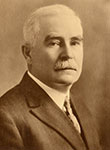Joseph Cullinan
Joseph Cullinan was born in 1860 in Pennsylvania. He began working in oil fields at age 14 and learned many tasks associated with oil production. At age 22, he became affiliated with Standard Oil, and in 1895, organized a company that managed steel storage tanks.
Around this time, Cullinan accept an invitation to advise developers who had discovered oil in Corsicana, Texas. He soon founded a company that was later known as the Magnolia Petroleum Company and opened its first refinery in 1899. Concerned with wasteful, polluting methods in the industry, Cullinan also was instrumental in persuading the Texas legislature to pass an petroleum conservation law in 1899.
When oil was found at Spindletop, Cullinan followed and launched a new corporation that was later known as Texaco. In 1905, he moved Texaco’s headquarters to Houston. Cullinan founded other oil-related companies and helped develop other petroleum sites throughout Texas. When he retired the presidency of Texaco in 1913, the corporation controlled more than four percent of the nation’s oil production.
Like many other wealthy American men in the early twentieth century Mr. Cullinan decided to become a philanthropist. In Houston, he worked with the Chamber of Commerce, supported the development of the Houston Ship Channel, and served with the Food Administration during World War I. He was a patron of the Museum of Fine Arts, Houston and the Houston Symphony.
Cullinan and his wife Lucy had five children. One son, John Halm Cullinan served as a lieutenant during World War I and led African-American soldiers, but died at a young age within a year of the war’s end. Cullinan soon found a way to memorialize his son and to continue his philanthropy.
After witnessing the hard work and dedication of five African-American physicians who hoped to build a better hospital in Houston for their community, Cullinan decided to help. In 1925, he contributed $80,000 for the construction of a three-story, fifty-bed hospital. The city of Houston donated three acres of land at 2900 Elgin Street and Ennis.
The Houston Negro Hospital was dedicated on June 19, 1926, a major holiday known as Juneteenth, which commemorates the day emancipation became effective in Texas. On that day, Mr. Cullinan placed a bronze plaque on the hospital’s first structure, known as the Cullinan Building. The plaque reads:
This building, erected A.D. 1926 in memory of Lieutenant John Halm Cullinan [J.S. Cullinan’s son]…one of the millions of young Americans who served in the World War to preserve and perpetuate human liberty without regard to race, creed or color, is dedicated to the American Negro to promote self-help, to inspire good citizenship and for the relief of suffering sickness and disease amongst them.
Houston Negro Hospital opened to patients on May 14, 1927. Four years later, another donation from Mr. Cullinan allowed for the construction of the Lucie H. Cullinan Annex, named for his wife who had died in 1929. The structure was established as an educational facility and residence hall for black nurses who were training at the hospital.
Mr. Cullinan died in 1937. His will provided an endowment of more than $500,000 to support the Houston Negro Hospital for many years.
Next Biography:
William Edward Burghardt (W. E. B.) Du Bois
Return to: The Houston Negro Hospital
Return to: Houston – A Place to Practice


